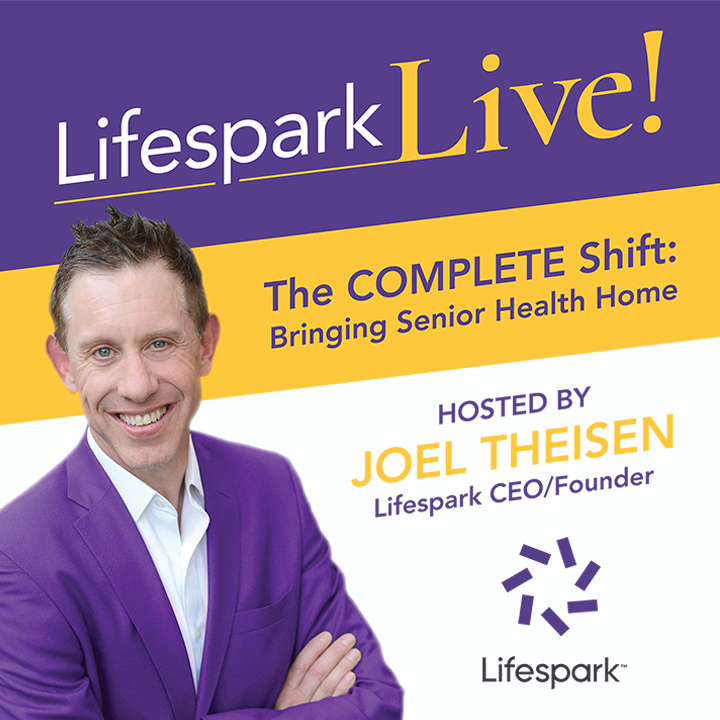
Listen to our first episode: Why Understanding the Mindset of ‘Boomer Nation’ Could Hold the Key to Your Senior Strategy’s Success; Conversation with Steve Gillon
Boomers are at it again. This time, disrupting their own aging experience. Since birth, this generation has been the shakers behind significant change in this country. No surprise they are the ones influencing one of the biggest shifts in health care today that will affect how people age in this country.
In Lifespark’s first video podcast, Lifespark Live: The COMPLETE Shift, CEO Joel Theisen talks candidly with historian, Steve Gillon, about Boomer Nation and how industries are not ready for what this ‘non-passive generation’ is about to demand. And if history tells us anything, this is a generation unlike any before that is known for transforming the way we do medicine. The discussion between Joel and Steve may just hold the keys to unlocking successful strategies for companies serving the senior population.
“This whole concept of retirement and aging as it was defined by past generations is going to go out the window,” explained Steve. “Throw out conventional wisdom for how we approach the aging market, what you did in the past isn’t going to work.”
Boomers are one of the largest populations in the United States, close second to the Millennials. And while today’s Gen Z’s have coined the term ‘boomer’ as a description of someone who is close-minded or resistant to change, they really haven’t caught the true essence of a generation that is not only open-minded but change-making.
“Despite all their differences in terms of geography, race, and class, there’s a certain theme that runs through this generation which sheds light on how we should address aging,” said Steve.
Coming at it from the ‘payvider’ perspective, Joel adds, “We have the opportunity to think about things beyond just basic needs – not just the quality of goods, but the quality of our lives.” As we look at serving a growing senior market, we need to understand what drives them to access services. We’ve learned people don’t want to be medicalized; they want to remain human and independent and keep autonomy. “Using that as the driving force behind how we serve seniors can shift our approach to match a generation’s demands for how they want to age,” said Joel.
So, what does Boomer Nation want? Here are a few themes Steve shares in our podcast about what history tells us this generation will demand out of their health care experience:
- Expanding choice — Their greatest legacy has been how they’ve expanded the range of choices people have about the way they live their lives. Whether it began with the African American freedom struggle, the women’s movement, or the gay rights movement, all these things were about expanding choices and this generation was at the helm, changing the trajectory of history.
- Empowerment in decision-making— Not only did they empower other people, but they want to be empowered themselves to make decisions and to make decisions on their own.
- Purpose –Having purpose matters to their health. To be self-sufficient and independent means to live at home for as long as possible and they’ll go to great lengths to accommodate that. It will take more than medical services. It will take services that are all encompassing, holistic in nature, and foster a sense of purpose to drive engagement.
- Listening vs Telling – Instead of telling them what to do to stay healthy, companies and providers will need to shift towards listening to what boomers need and delivering on plans that meet those goals; this generation wants to take an active role in their health and well-being.
For those in health care – providers, payors, and health systems alike, applying this knowledge to their strategies can reap major results. Collaborating, partnering to build trusted relationships, and creating opportunities to adjust our models and services to meet this generation’s changing needs will go far. A stagnant, one-size-fits-all approach won’t work for a generation that is very individualized.
“If you understand these basic concepts that grow out of a history of understanding this generation, you will be in a good position to respond to where people are in this stage of their journey,” said Steve. “They want a health care system that responds to all their needs, not just the medical. If you can do that, you’re already ahead of the game.”
What do you think? How are you shifting your strategies to better serve people as they age? Share in our comments.
To hear more of Joel and Steve’s full conversation, listen in to our podcast. And visit our web site for more information about how you can be a guest and subscribe to future episodes.


